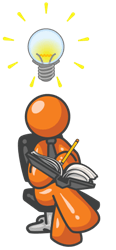Best English Lesson Plans
 Every teacher wants to know how to write the best English lesson plans
so here are some simple tips for you.
Every teacher wants to know how to write the best English lesson plans
so here are some simple tips for you.Click Here for Step-by-Step Rules, Stories and Exercises to Practice All English Tenses
What do the best English lesson plans need?
An aim
When I started teaching, I found this tough. The aim is the ‘why’ of the lesson and without it you can plan nothing. Start at the aim and work back. For example if your aim is to provide speaking practice in a particular situation then make sure you give your students the grammar, vocabulary and background information they need before they can talk to each other. Tell your students what the aim is, and then they will stay focused too. It is also good to recap the aim at the end of the lesson so the students leave knowing what they have achieved.Relevance
Keep the lessons relevant to the class. There is no point doing a lesson based on politics for a class of elementary school age kids, and a lesson about the current teen star won’t be of much interest to most adults! Find subjects the class will be interested in and base your lessons around these. If possible, get your students to choose the subjects themselves.Variety
Make sure you vary your tasks so your students don’t get bored. Try and include different activities for students with different learning styles. For example, some visual tasks (try using picture activities), some physical tasks (try getting your students to act things or move round the class), some audio tasks (music is great if you use it in the right way), and some old-fashioned reading and writing tasks. Even adults start to lose interest after about 30 minutes so keep each stage short.Plan B
I don’t mean you need to write two lesson plans, but it’s a good idea to have some extra activities you can use if something doesn’t work, or if students finish too soon. If you did a reading activity and they finished too early, get them write comprehension questions for a partner, or give them dictation on part of the text. Having extra activities prepared means you don’t panic if you finish early and gives students extra practice.Interest and personality
Don’t become a teaching machine. Put something of your own personality into your lessons. Your students will appreciate this. If you like music, write a lesson plan around a particular song. If you are a keen sports person then use that to create fun games and activities. Your enthusiasm for the subject will be clear and your students will also be enthusiastic about learning. Humor is also important in lessons and can be used at any level.Warm up
Warm up activities are essential. If you exercise then you need to warm up first so your body can get the full benefit of your training. It’s the same with mental training. If you give your students challenging work to do before they have tuned into English, it may be too difficult for them and they will lose motivation. A 5 minute word game or a quick conversation with a partner is all you need. Try and keep it relevant to your lesson to maximize learning.There are lots of things to think about but these tips will help you write the best English lesson plans possible.
Get Updates, Special Offers, and English Resources
Download your FREE GIFT (the first two chapters of
English Short Stories Book and Workbook)
as soon as you join!

By submitting your email, you consent to receiving updates and newsletters from us and to the sharing of your personal data with third parties for the purposes of sending you communications. We will not spam you. You can unsubscribe at any time. For more information, please see our privacy policy.
Return from Best English
Lesson Plans to
How to Teach English – English Language Teaching Articles





